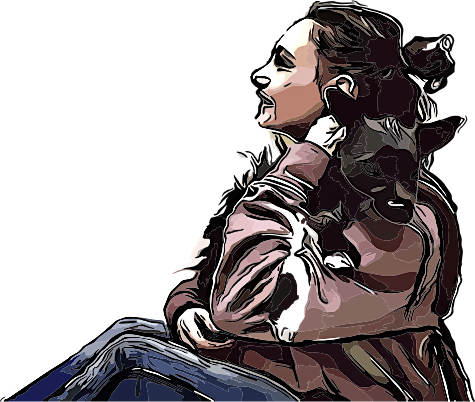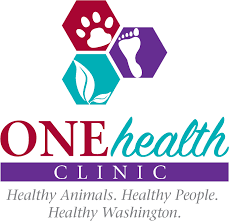Staff at a homeless shelter noticed that so many young people experiencing homelessness had animals.
It was also evident that most would seek veterinarian care for their pet before taking care of their own health needs.
A dual purpose health care project was established in 2018 called One Health Clinic (OHC) based at New Horizons, a Seattle shelter for unhoused youth. So the OHC was born out of a need to provide better, more accessible care for people who lack housing and the animals they love.
Seattle native Grace S. recalled that her sidekick, Nugget, a Jack Russell Terrier/Toy Poodle mix, needed vaccinations and other vet care. She and Nugget were homeless and not in a position to afford the cost of care for him. At 23, Grace was struggling with her own challenges. Homeless and in need of medical care herself, she was regularly showering and eating at a drop-in homeless center run by a local church. But it was Nugget’s needs that were top of mind for her.
As luck would have it, both Nugget and Grace were about to get all the care they needed — and at no cost — courtesy of a dual purpose health care project at One Health Clinic. Grace said, “I guarantee you that having Nugget and wanting to make sure he was healthy and was getting what he needed motivated me to seek care and preventive care for myself that I probably wouldn’t have sought otherwise. I think a lot of people in my position who have a pet feel that way.”
There is a need
Unhoused youth and young adults often told outreach workers that having an animal could be a barrier to getting care. Primarily because animals are often unwelcome in clinics and, the young people said, they had nowhere to safely leave their pet during a visit. There was a lot of interest in accessing affordable veterinary care for their companion animals.
The thinking at the OHC in Seattle was that if a clinic could offer free care for both people and pets alike, that the animal’s needs might draw owners to the clinic, where they could then tend to their own health care needs, as well. With that in mind, OHC initiated a pilot project to provide care to homeless youth and adults up to age 26 as well as their pets, companion animals, emotional support animals and/or service animals.
‘Not your average clinic’
- For patients, the services includes mental health treatment, family planning, gender-affirming care, and testing for sexually transmitted infections. Injuries are also addressed, along with substance use issues, and referrals to specialists are provided as needed.
- For pets, there are routine vaccinations, flea treatments and referrals for spay/neuter services.
Between 2018 and 2021, the clinic helped 236 animals. And human patients are signaling their approval. The clinic saw a 40% rise in patients in the first year alone, and nearly half of visitors the following year were returnees. “Everyone there is really there with the purpose of wanting to help,” Grace said. “So the whole approach is gentle and friendly. It’s not your average clinic.”
A Unique Facility
It also appears to be unique: Dr Tin, one of the clinic founders and family medicine clinician from the University of Washington, said she’s unaware of any other clinic in the United States that cares for both humans and animals in adjacent clinic spaces — apart from a second OHC that is now open in downtown Seattle. She noted that the original OHC clinic is “beyond the project phase.” It’s now a permanently established twice-a-month service.
From the Annals of Family Medicine September 2022
Lessons Learned
“Patients have stated the OHC has given them peace of mind knowing they can seek timely and quality care for their animals. The OHC also provides opportunities for interdisciplinary learning between medical students, veterinary students, and other health professionals. This learning occurs during clinic visits and through an interprofessional case conference at the end of each clinic where overlapping aspects of human and animal cases are discussed.”
